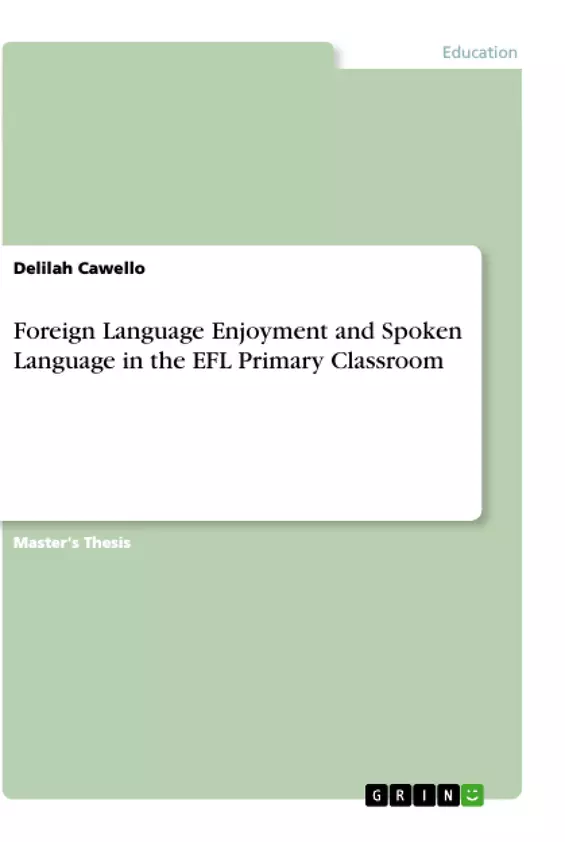Shopping dialogues, conversations, giving directions, introducing oneself, songs, rhymes, and chants. All of these terms refer to spoken language activities that primary school children stated that they strongly enjoy in the English lesson. It is a well-known fact that the most important competence in foreign language learning (FLL) is speaking. Besides listening comprehension or reading and writing, oral speech production helps the learner to acquire a language most effectively. It is not only essential for succeeding but also places the focus on the learner who actively performs and speaks in the new language to learn it. The result of active involvement is substantial enjoyment. In primary schools, this is especially the case when the activities conducted are designed in such a way that they elicit foreign language (FL) learners’ interest by meaningful implementations or authentic content that applies to their own life.
Inhaltsverzeichnis (Table of Contents)
- Introduction
- Foreign Language Learning and Young Learners
- Foreign Language Learning
- Foreign Language Learning in the EFL Primary Classroom
- The Role of Affective Factors in Foreign Language Learning
- The Role of Affective Factors in Language Learning Theory
- The Role of Affective Factors from a Neurolinguistic Perspective
- Foreign Language Enjoyment
- Definition
- Current State of Research
- Teaching Spoken Language
- The Role of Spoken Language
- Current Methodology
- Empirical Study
- Methodology
- Research Questions and Expected Outcomes
- Methodological Approach
- Subjects
- Elicitation Procedure
- Data Analysis
- Research Results and Discussion
- Methodology
- Conclusion
Zielsetzung und Themenschwerpunkte (Objectives and Key Themes)
This thesis investigates the role of foreign language enjoyment (FLE) in spoken language activities within the EFL primary classroom. The primary goal is to identify how FLE manifests itself among young learners and examine its potential impact on the learning process. The study aims to answer questions about the relationship between FLE and the effectiveness of spoken language teaching methods in primary schools. This investigation delves into the experience of young learners and seeks to understand how their enjoyment of language activities contributes to their overall language development.
- Foreign Language Enjoyment in Young Learners
- The Impact of FLE on Spoken Language Learning
- The Role of Affective Factors in EFL Primary Classrooms
- Qualitative Analysis of FLE in Spoken Language Activities
- Effective Teaching Strategies for Promoting FLE in Primary Schools
Zusammenfassung der Kapitel (Chapter Summaries)
- The introduction discusses the importance of spoken language in foreign language learning and highlights the significance of foreign language enjoyment (FLE) in promoting effective learning. It also introduces the research questions and the methodological approach used in the study.
- Chapter 2 provides an overview of foreign language learning and its specific application within the EFL primary classroom. It examines the role of affective factors in language learning theory and neurolinguistics, with a particular focus on FLE and its definition and current research.
- Chapter 3 explores the role and current methodologies of teaching spoken language in the EFL primary classroom. It considers how teachers can effectively integrate spoken language activities into their lessons while ensuring that the activities are engaging and enjoyable for young learners.
- Chapter 4 delves into the methodology employed in the empirical study, including the research questions, the methodological approach, the study participants, the elicitation procedure, and the data analysis techniques utilized.
Schlüsselwörter (Keywords)
This thesis centers around the intersection of foreign language enjoyment, spoken language development, and affective factors within the EFL primary classroom. Key concepts include: foreign language enjoyment (FLE), spoken language learning, primary education, affective factors, qualitative research, language acquisition, EFL pedagogy, and teaching methodologies. The study explores the relationship between these concepts and their potential impact on language learning outcomes for young learners.
Frequently Asked Questions
What is Foreign Language Enjoyment (FLE)?
FLE refers to the positive emotion and satisfaction learners experience during foreign language activities, which is a key affective factor in successful learning.
Which spoken language activities do primary students enjoy most?
Research shows that shopping dialogues, songs, rhymes, chants, and introducing oneself are highly enjoyed by young EFL learners.
Why is speaking considered the most important competence in FLL?
Oral production helps learners acquire language most effectively by actively performing and speaking, which leads to deeper engagement and enjoyment.
How do affective factors influence language learning?
Affective factors like enjoyment, motivation, and interest play a crucial role from both a theoretical and neurolinguistic perspective in how effectively a child learns English.
What are effective strategies for promoting FLE in schools?
Teachers should implement meaningful, authentic content that relates to the children's lives and uses active, performing methodologies.
- Quote paper
- Delilah Cawello (Author), 2021, Foreign Language Enjoyment and Spoken Language in the EFL Primary Classroom, Munich, GRIN Verlag, https://www.grin.com/document/1139109



